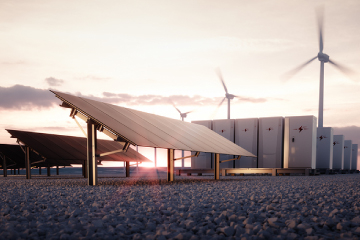- Why EDF power solutions?
- About UsAbout UsWe’re committed to providing future generations with the means to power their lives in the most economic, environmental and socially responsible ways possible.
- What We DoWhat We DoWe are a market-leading, independent power producer and service provider, delivering: wind (onshore and offshore), solar photovoltaic, storage, and electrical vehicle charging.
- Landowners
- Suppliers
- Projects
- Careers
- News
- Contact
Circular Solar: Recycling and Decommissioning
Solar energy has a big role to play in creating a cleaner environment and helping to reduce greenhouse gas emissions that contribute to climate change. However, as with any type of power generation equipment, when solar panels reach the end of their lives, it’s important that they be disposed of safely – and ideally, that they be recycled to the fullest extent possible.
As the US solar industry continues to grow and mature, we recognize the capacity to recycle solar panels also needs to ramp up significantly. At present, the industry’s recycling needs are limited to panels that are broken or damaged during construction or operations.
However, by the end of this decade, US solar projects will reach the end of their operational lives, yielding tens of thousands of panels that will need to be recycled in the decommissioning phase. By the 2040s, it is expected that millions of panels will be taken out of use each year in the US alone (within EDF Renewables’ portfolio, we anticipate solar decommissioning will begin in the mid-2030s).
In support of our own as well as the solar industry’s current and future needs, we are working closely with our industry peers and trade associations to develop best practices and help scale our nation’s recycling capacity.
In keeping with this, and as part of our commitment to minimize the environmental footprint of our operations, we signed an agreement with SOLARCYCLE in 2023 to recycle solar panels that are damaged or broken during construction and operation at our grid-scale, distribution-scale, and onsite solar installations.
We selected SOLARCYCLE as a preferred partner because of their deep commitment to innovation and proven high-value recycling process. SOLARCYCLE’s proprietary technology allows for the extraction of 95% of the value from recycled panels, including silver, silicon, copper, aluminum, and glass, a significant increase over the industry standard which is currently below 50%.
SOLARCYCLE’s efficient reverse logistics make it possible to cost-effectively collect damaged panels and return them to a recycling facility for resource recovery. In addition, the company offers transparency and verification through advanced environmental reporting. In the future, SOLARCYCLE hopes to sell recycled raw materials to panel manufacturers based in North America, thereby creating a closed-loop system that maximizes environmental benefits and supply chain resilience.
The ability to recover and reuse key materials is an important part of the equation when it comes to further increasing the sustainability of solar energy. For solar to truly achieve its full potential, the US must create domestic supply chains and a vibrant secondary market for upcycled panels and recycled materials. In 2022, researchers at the National Renewable Energy Laboratory found that with modest government support, recycled materials can meet at least 25-30% of domestic solar manufacturing needs in the US by 2040.
We also recognize that ensuring projects are responsibly decommissioned at the end of their 30-40-year operational lives is an important part of our commitment to be a trustworthy partner to the communities that host our projects.
Prior to the construction of any project, EDF Renewables enters into a decommissioning agreement with the relevant local jurisdiction(s) that includes a plan for the removal of all equipment at the end of the project’s life.
The agreement requires EDF Renewables to adhere to all state and local rules pertaining to decommissioning, thereby ensuring landowners and other taxpayers are not impacted. In many cases, these agreements will require some form of financial security to ensure the project will have the resources needed to complete the decommissioning process.
As a result of these actions and commitments, EDF Renewables is continuing to play a leadership role in the clean energy industry and laying the groundwork for a truly sustainable clean energy future.
- © 2026 EDF power solutions North America
- Privacy Policy
- AB 1305 Disclosure
- TCFD Report
- EDF power solutions


